Microorganismos en defensa de las plantas
Una lucha contra el cambio climático
Abstract
La producción agrícola se ha visto afectada por el cambio climático y las consecuencias se agudizarán en las siguientes décadas. Las plantas cohabitan con una gran diversidad de microorganismos que tienen la capacidad para promover el desarrollo vegetal y aumentar la producción agrícola aún bajo ciertas condiciones de estrés, incluso pueden mitigar los efectos del cambio climático como la sequía y las altas temperaturas y, de esta manera, garantizar la seguridad alimentaria. El cambio climático ha iniciado una guerra contra la agricultura, y la primera lucha será comandada por los microorganismos.
References
Sharma, B., Singh, B.N., Dwivedi, P., & Rajawat, M.V.S. (2022). Interference of climate change on plant-microbe interactions: present and future prospects. Frontiers in Agronomy 3, 725804. https://doi.org/10.3389/fagro.2021.725804.
Rodríguez, R., & Durán, P. (2020). Natural holobiome engineering by using native extreme microbiome to counteract the climate change effects. Frontiers in Bioengineering and Biotechnology 8, 568. https://doi.org/10.3389/fbioe.2020.00568.
Santoyo, G. (2022). How plants recruit their microbiome? New insights into beneficial interactions. Journal of Advanced Research 40, 42-58. https://doi.org/10.1016/j.jare.2021.11.020
Basu, A., Prasad, P., Das, S.N., Kalam, S., Sayyed, R.Z., Reddy, M.S., & El Enshasy, H. (2021). Plant growth promoting rhizobacteria (PGPR) as green bioinoculants: recent developments, constraints, and prospects. Sustainability 13, 1140. https://doi.org/10.3390/su13031140.
Trivedi, P., Batista, B.D., Bazany, K.E., & Singh, B.K. (2021). Plant-microbiome interactions under a changing world: response, consequences and perspectives. New Phytologist 6, 1951-1959. https://doi.org/10.1111/nph.18016.
Petipas, R.H., Geber, M.A., & Lau, J.A. (2020). Microbe-mediated adaptations in plants. Ecology Letters 24, 1302-1317. https://doi.org/10.1111/ele.137557.
Acuña-Rodríguez, I.S., Hansen, H., Gallardo-Cerda, J., Atala, C., & Molina-Montenegro, M.A. (2019). Antarctic extremophiles: biotechnological alternative to crop production in saline soils. Frontiers in Bioengineering and Biotechnology 7, 22. https://doi.org/10.3389/fbioe.2019.00022.
Fitter, A.H., Heinemeyer, A., & Staddon, P.L. (2000). The impact of elevated CO2 and global climate change on arbuscular mycorrhizas: a mycocentric approach. New Phytologyst 147, 179-187. https://doi.org/10.1046/j.1469-8137.2000.00680.x.
Milovic, M., Kebert, M., & Orlovi, S. (2021). How mycorrhizas can help forests to cope with ongoing climate change. Sumarski list 145, 279-286. https://doi.org/10.31298/sl.145.5-6.7.

Downloads
Published
How to Cite
Issue
Section
License
Copyright (c) 2023 Revista de divulgación científica iBIO

This work is licensed under a Creative Commons Attribution-NonCommercial-NoDerivatives 4.0 International License.
Self-archiving or deposit of the works in their post-publication version (editorial version) is permitted in any personal, institutional or thematic repository, social or scientific networks. The above applies from the moment of publication of the article in question on the website of the Revista de divulgación científica iBIO.




